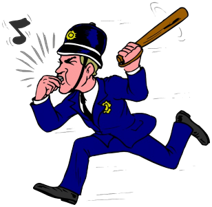Types & Functions of Determiners
Determiners have two main functions:
Referring nouns - They make the reference of nouns more specific or general
Quantifying nouns
Referring Determiners
Referring means showing us who or what the noun is pointing to or talking about.
They tell the reader or listener whether we’re referring to a specific or general thing.
General determiners - used when we are talking about people or things in an indefinite way.
Specific determiners - used when we are talking about specific people or things.
The most common types of determiners which we use for referring are articles, demonstratives and possessives.
Articles
That is, a/an, the
- INDEFINITE ARTICLES (a, an) - They are General determiners, because general version of noun is referred to.
A man came into the shop.
An honest person would not cheat.
- DEFINITE ARTICLES (the) - It is a Specific determiner, because specific noun is referred to.
The cop chased the thugs.

Demonstratives
That is, Demonstrative Pronouns: this, that, these, those
They are Specific determiners. They are used to point some specific noun within a sentence.
They specify the distance of something in space or time in relation to the speaker.
This & These - for close by nouns (in space or time) That & Those - for nouns that are further away (in space or time)
This car is better than that one.
These grapes are greener than those ones.
This summer is the warmest I can remember.
Possessives
These are Specific determiners. These are words that are used to show specific ownership (of noun)
- Possessive determiners: my, your, his, her, its, your, our, their
I gave my bike to her brother.
Possessive determiners, which go with a noun / noun phrase, are not the same as Possessive pronouns (e.g. mine, hers, ours, yours, theirs etc.), which can stand alone.
This is my pen. (possessive determiner)
This pen is mine. (possessive pronoun)
- Possessive case of nouns: x’s (possessive ’s)
Mragank’s new job is awesome.
They may itself include one of the other determiners.
I spoiled my mother’s rug. (here mother’s has been used with another determiner ‘my’)
Interrogatives
That is, which, whose and what
- Which and whose are specific determiners.
Here are the books you ordered. Which book do you think is the most interesting?
Which library did you go to?
Whose book is that?
- What is a general determiner
What food do you like?
I don’t know what job she does.
Quantifying Determiners
‘Quantifying’ means showing how much of something there is, or how many.
The most common types of determiners which we use for quantifying are Quantifiers, Numbers and Distributives.
Quantifiers
That is, (a) few, fewer, (a) little, many, much, more, most, some, any, a lot of etc.
They indicate how much or how little of the noun is being discussed.
I’ve got some milk but I haven’t got any tea.
Only a few experts know the answer to that.
Selecting the correct quantifier depends on your understanding the distinction between Countable and Non-Countable Nouns.
Numbers
cardinal (one, two, three…), and ordinal (first, second, third…)
Four rebels were found hiding in the basement.
Nadal lost in the second round of the French open.
Grammatically speaking, the words next, last, another, previous, subsequent, can also be regarded as ordinal numbers. (some call them General ordinals)
It rained on the last day of our holiday.
The next house is the one where Mr. Antonio lives.
I want another glass of milk.
Distributives
That is, all, both, no, half, either, neither, each, every
Each child was vaccinated.
Every troop was given a helmet to wear.

Extra Books and Tools
If you prefer to learn via books, or want some good English Grammar books for reference purposes, you may read this article which enlists some of the books recommended by us.